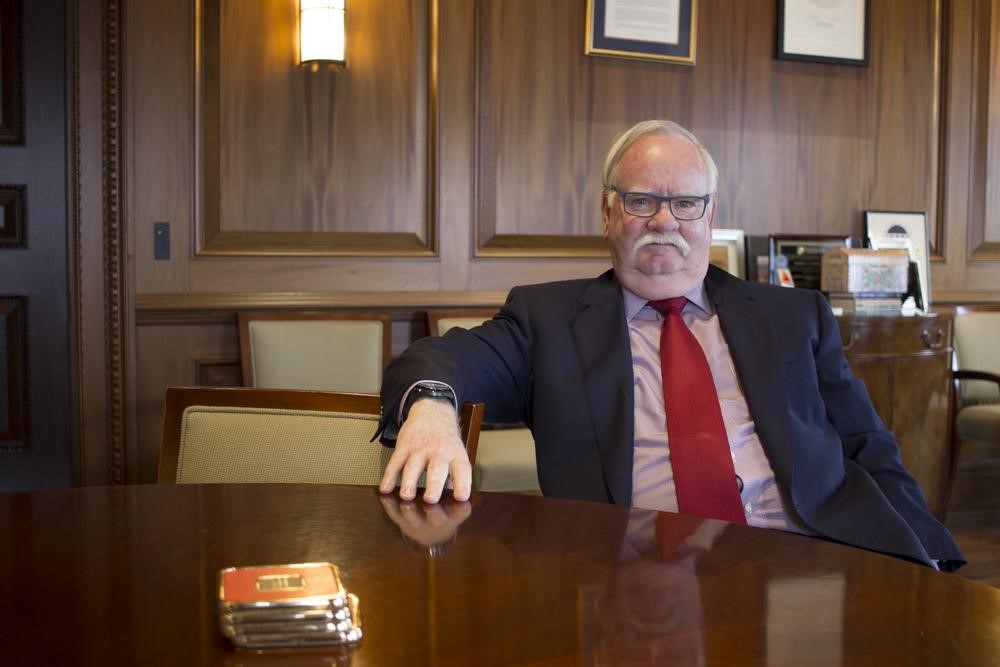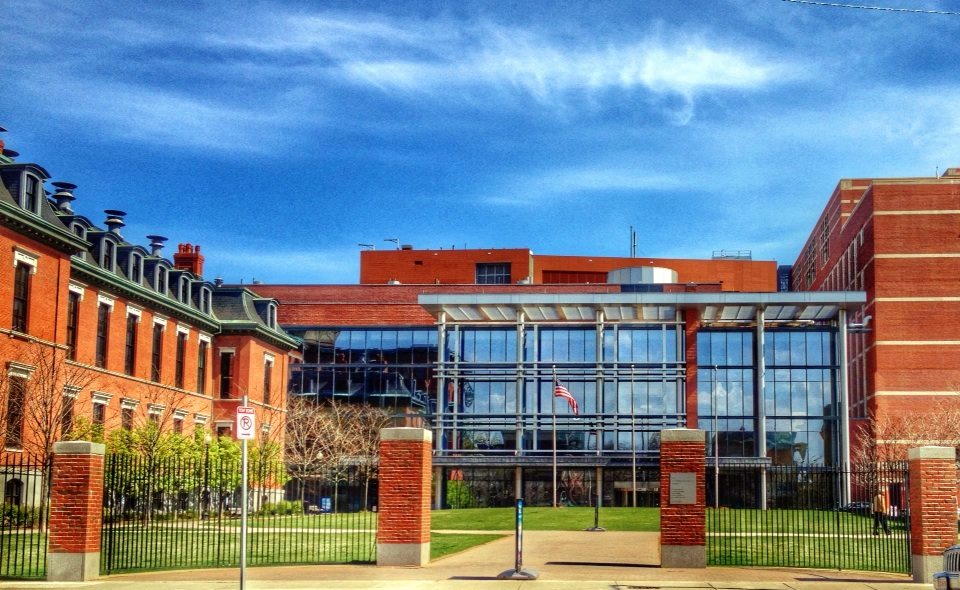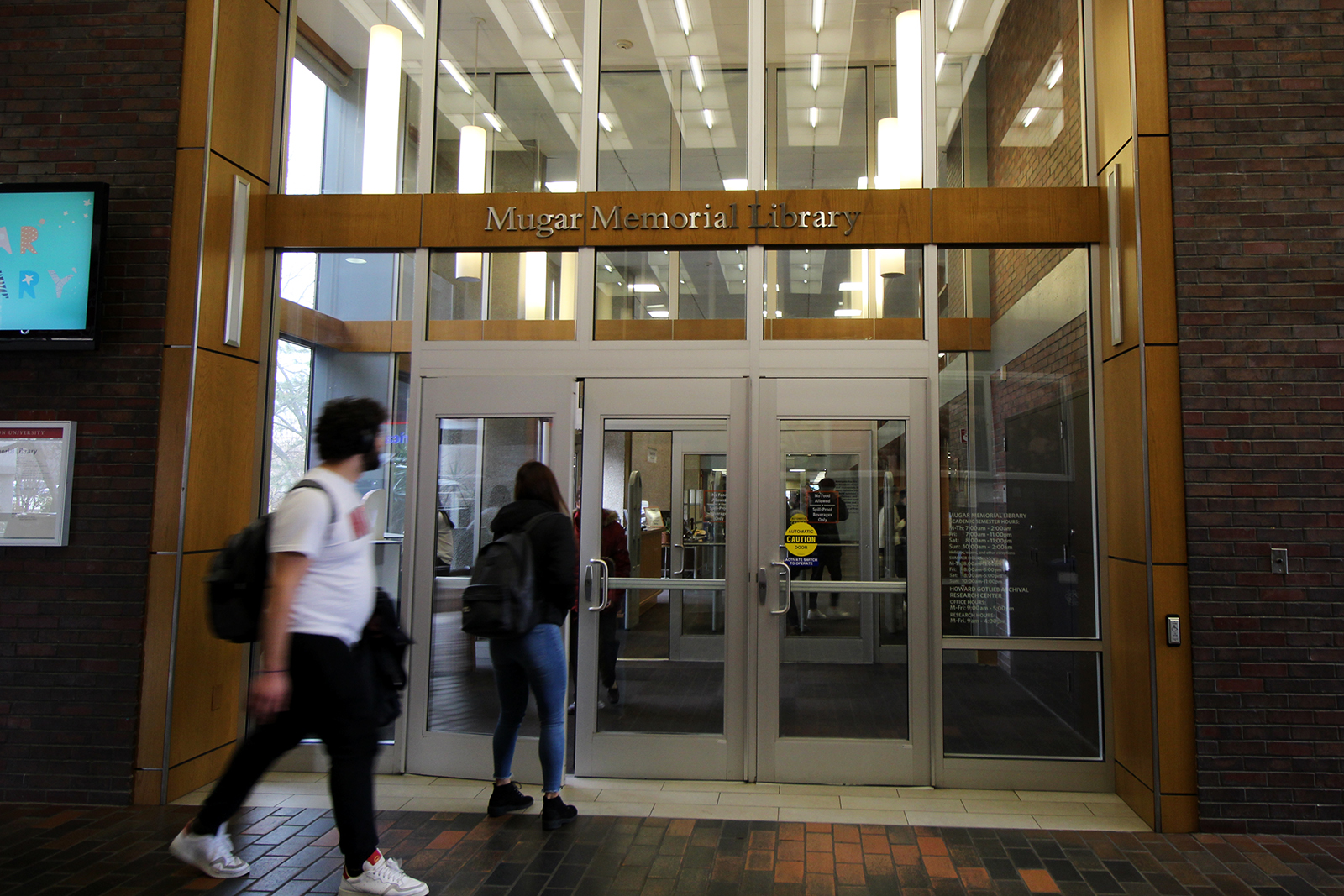
As Boston University’s first semester with the Learn from Anywhere model draws to a close, students, faculty and staff are making plans for next semester. COVID-19 cases are on the rise, leading BU community members to wonder how the pandemic will impact the Spring 2021 learning experience.
President Robert Brown spoke about the University’s vision for the upcoming semester and addressed the community’s concerns in an interview with The Daily Free Press Thursday. He said students can expect a similar start to Fall 2020, but as the pandemic changes, so will those plans. Brown added the University is hoping to bring back more BU community members to enhance the on-campus experience and is looking into COVID-19 vaccinations.
Read the transcript of our interview with President Brown below. Excerpts have been edited for clarity. (Skimming for quick answers to your major questions? Find the highlights bolded in red.)
These past few weeks, we’ve seen an uptick in COVID-19 cases in the BU community. Do you see this increase affecting BU’s reopening plan for the Spring 2021 semester? What steps are being taken to mitigate community spread?
One of the things that is absolutely true is BU is, as a community, existing inside a state and a city where there’s a rising rate of cases in the city and the state. In fact, if you look at it, quantitatively from September, today we’ve gone up over a factor of 10 in terms of daily number of cases in the city.
I want to distinguish between the impact of that in the community and transmission of the disease inside our community. I think our Healthway system has done a really great job of containing the spread of the disease inside the community against this rising tide of cases that are affecting people in the Boston area. Where we sit right now, we’re monitoring this really closely, but we’re not seeing a rising level of transmission within BU. We’re just seeing this rising tide of cases in the city and the state. Our contact tracing, quarantine, isolation, people adhering to the public health protocols on campus, have done a really great job of containing it. We still have the same challenge we’ve had all semester of gatherings in residences and trying to stay safe in small pockets of people. Right now, there’s no plan to change anything for the Spring, but we’re monitoring it and we will be monitoring it very closely over the next month.
The University decided not to reinstate Credit No-Credit for the semester. We’re curious as to why this is? Is there a chance it could be in Spring?
I’ve said this about eight times. We did it in the Spring because that was an abrupt transition. We forced everyone to go remote in a period of five days, and we felt it was fair to the students to give them the option at the end of the day.
This wasn’t that situation at all. We all knew from day one what was going to happen and how it was going to work. Grades are a very important part of the college process, both for people in terms of presenting themselves for graduate school and employers and other things. There’s a downside of being pass fail or Credit No-Credit. And it was a totally different circumstance. We thought about this at length back in the summer, made a decision, saw no reason to back away from that decision. I don’t think we’ll see any reason, unless something abrupt happens, to back away from that in the Spring.
Many students did not find the quality of education this semester to meet their expectations. What do you think would be an appropriate way to address the poor quality of learning for students learning virtually?
I believe that as we go forward, our faculty and all of our processes, and this is true for every residential university, are really geared for in-person learning. We’ve been put in a very difficult situation of having some fraction of our students in person and some fraction of our students remote, and it’s suboptimal. There’s not a lot we can do to optimize that other than trying to get more and more people back in the classroom, and it’s not going to be perfect in the Spring because Spring is going to look a lot like the Fall in many ways. But hopefully, by next Fall, we’re back to a situation that looks more or less like the residential University we all aspire to be.
There were a set of surveys that were done in the schools and colleges of students’ LfA experiences. We decided to let the schools and colleges do it, not to do it uniformly, because they had real specific knowledge of their offerings and details. Those are all aggregated through Sue Kennedy’s office, the associate provost for Undergraduate Affairs. There was also surveys of the faculty’s view of how it worked.
How has your salary and other senior leadership salaries changed since the pandemic? What is the difference between your salary pre-COVID-19 and now?
I took a 20 percent salary cut early April, and all the senior leadership took a 10 percent salary cut.
That covers us through the fiscal year. Our fiscal year runs July 1 to June 30. We’re now in the budget process for the next fiscal year, and we think we’ll return to somewhat of a normal budgeting process at that point.
What happens to students who test positive for COVID-19 at a BU testing before winter break? Will housing be open to students who need to finish their isolation/quarantine period and who live off campus or in BU Housing that is unavailable during winter break (Warren Towers, Bay State Brownstones, the Towers, Sleeper, Claflin and Rich, etc.)?
I don’t have exact knowledge of the answer to this question, but I understand everything is staying open all the way through the intercession, and isolation and quarantine will remain available. Obviously, the numbers will probably go down because the number of students is going down, but we’re also offering isolation to off-campus students who are going to be testing throughout the intercession. Those facilities will remain open.
In terms of isolation, obviously, we hope people don’t travel. A number of students over time have had their parents pick them up and quarantine at home. My understanding is some facilities will stay open through the holidays.
Have there been discussions about faculty requests to be able to Teach from Anywhere? Why does the University believe it is important to bring faculty back to campus next semester?
Our whole accommodation process for requesting to be able to teach remotely because of underlying conditions or age, I think was instituted in November. It is complete at this point for the faculty. It’s the same process we ran during the summer.
What is very important in this is fairness to people. We can’t be an institution where everyone gets to do exactly what they want, because we have thousands and thousands of students who want to come and take classes in person, that are on our campus. That means there’s a certain number of people, staff, faculty, custodians, people in the dining halls, who are going to be on campus. We have to have a system to decide who has an accommodation not to be there, and who should be there. That’s the process we put in place. It is a rigorous process because fair processes usually are rigorous. Otherwise, they have loopholes.
Faculty have also commented that workplace accommodations are strict. What is your response to this, and why are the accommodation guidelines as they are?
I think out of fairness to people, you cannot just give free choice to everyone. You have to have standards for those accommodations, which the Centers for Disease Control [and Prevention] has set, and we’re adhering to those pretty rigorously across the schools and colleges.
There are some cases where we have made special accommodations because we realize that the content is not easily taught in LfA: you either have to be all in person or all remote. I think our deaf language programs in the Wheelock College of Education and Human Development, we made the decision to let them be all remote, just because it was too hard to do Sign Language teaching to both an in-person and a remote class. There were some exceptions made but very few actually.
What are your honest thoughts on how the University handled the pandemic this fall? What do you think went well and what would you like to improve for next semester?
I had to do a lot of soul-searching. I think we have done as well as about any university in the country, overall. That’s not a brag, it’s just where I think we are. We’ve managed the disease on campus. We’ve had a safe environment on campus. Our testing protocols are about as seamless as anyone’s, it’s easy to use. And we’ve been fair to people. Fairness is very important, trying to get compliance from students, faculty and staff, and [we] created an environment, and we got an enormous amount of help from the student body, where people wanted to comply.
That doesn’t mean everyone’s going to be perfect. I mean, we can’t be, but the compliance has been just exceptional with the student body. I give the AdLab and the PRLab and their campaign enormous amount of credit for this. I think the student body as a whole went in and took it on themselves to say this is their environment. They own a piece of it. They own compliance in a way that if you look out nationally, I don’t think you’ll find other schools, maybe a handful, where part of the student body said, “Okay, this is our environment. We’re responsible.” And that’s why we succeeded. There’s no amount of testing we could have done without that. We’ve done well.
The LfA model, allowing to have students remote and in person, simultaneously, is just a challenge. It’s a challenge for the faculty and it’s a challenge for the remote learners. It’s a challenge for the in-person learners. We went to enormous effort in terms of outfitting classrooms and trying to train people and train moderators, and I think we’ll do better in the Spring just because we’ve done it before. But it’s still not the optimal way we would teach going forward. We knew that was a challenge in July and August. That wasn’t a surprise.
Overall, I give us a high grade. I’m not going to give us a letter grade, but we definitely pass. It was really a community effort. If the faculty and staff hadn’t wanted to make it work and the students hadn’t wanted to make it work, it would not have worked.
What changes are going to be made to LfA and Campus life for Spring?
On the LfA side, there’s work going into having more moderators. We understand that the moderators really help, so there’ll be more moderators in the Spring. There’s some technology upgrades that are going to be put in place over the Intercession. Those will help, but they’re not a substitute for the basic challenges.
In terms of student life, a lot of the issue is around where the disease is and the spread. What I imagine is we’re going to see a bit of an inversion from what we did in the Fall. We will start under a period of higher disease rate than we did in September. Over time the disease rate will drop, because two things will happen: there will be people that have become vaccinated in the system, and it will get warmer. People will start going outside.
We’re not looking at any, what I’d say changes in the January, February timeframe, but I imagine that there could be changes as we go through the Spring. We’re monitoring all of that carefully as we go. Some of it is state and city regulations. For example, [the Fitness and Recreation Center] and how we run a recreation center, those things are mandated by the city and the state at this point, but that could change.
Students have made comments about the increased food waste and trash coming from dining halls this semester due to takeaway boxes and plasticware. Is the University considering ways to improve sustainability and minimize food and packaging waste from the dining halls? What about adding more sites on campus where students can compost?
This hadn’t reached my level, but I’m passing this on to Peter Smakoski in Auxiliary Services and I’m sure they’ll come up with some ways of doing this. It is a challenge, because in the dining hall, people are more moderate about what they take because they can go back. The problem with an all-you-can-eat takeout meal is you just take a lot.
Going into the Fall, I can imagine that where we were, this was not a highest priority. Serving the meals was more important, but this is something we’ll work on.
The U.S. is seeing its first batches of COVID-19 vaccines get distributed over the next few months. At a Spring Back2BU meeting, Judy Platt said the University is planning its vaccine rollout. What does that plan look like?
It’s on everybody’s minds. If you look at where the vaccines are now, the vaccine rollout will be controlled at the state level. They are putting together a list, and it’s been coordinated with the federal government of priorities for who gets the vaccine. Right now, frontline health care workers are the first.
We’re working on that at a higher education level with other university presidents to see where we are, all of our different people on that list. That’s the first order of business is to understand when the state’s going to give vaccines for different categories of people.
The second question is how they will be distributed. I cannot say to you that I guarantee we’ll be able to be a distribution point. That will be decided by the state. We’re doing everything we can, as a university, to offer all the resources to be a distribution site. The state has to give me the vaccines.
Judy [Platt] and Gloria Waters, the vice president for Research, are leading a group that was just announced called the Vaccine Preparedness Group for the University: a group of people I’ve pulled together to answer all of these questions and to get us ready to be a distribution center. That won’t occur most probably until March, because the first wave of these vaccines are going to be distributed through hospitals, and they’re going to go to healthcare workers, and that will continue, my understanding, probably through February. Then you’ll get into the more general population, and those will be the people that have comorbidities, are over 65, etc. We would like to be there to start vaccinating at that point. And then the general student population will come later. And that’s where we really want to have the ability to give the vaccines, but there’s just a lot of unanswered questions right now, and it’s going to play out over several months.
The message I’d like to send, which is an unfortunate message, is we have to do it all again like we did in the Fall. Vaccines really are not going to play a role at the beginning of the semester except for really the health care workers who will feel safer because they will have been vaccinated.
I actually know how many vaccine doses we’re getting at the Boston Medical Center, and we will not have enough to vaccinate all of our health care people until late January. This is going to happen a lot slower than everybody wants. If you look at these schedules, you could easily be vaccinating the student population in the summer.
Are there plans for Learn from Anywhere, or some of the attributes of the hybrid model, to stick around post-pandemic? What would those attributes be and why?
That is really the question that all of society’s asking: when we get on the other side of this, what things have we learned that we want to keep? One of the things I will do is throw away the chair I am sitting in, because I’ve sat here on and off for nine months.
I believe there will be things that came from Learn from Anywhere and from remote education that we will incorporate. We have a group under Sue Kennedy, associate provost for undergraduate affairs and Jean Morrison, the provost, commissioned about a month ago, a group of faculty that are actually thinking about that right now. And they will bring a report forward probably early in the Spring. I think there are places and modalities where the things that we’ve learned to do are going to really give us a lot of opportunity.
You can imagine in [the College of Communication] going to study abroad someplace, and wanting still to take a class that’s offered in COM. Yet, you want to go do that second internship someplace. LfA in some classes may be the way to do that. There may be a local adoption of LfA modes for specific classes to facilitate students doing things that are non-residential. That could be part of our Study Abroad program.
But I don’t see it as everything’s LfA, I don’t think anybody sees that. There’s a whole question of remote education giving access to people. Going back to the American Sign Language courses, there may be courses that are better taught using a remote format than an in-person format. Those are all the kinds of questions we should ask. I think there will be a residual with us.
The biggest question: will we ever have a normal snow day again? Or will a snow day just be ‘Okay, we’re going online for today?’ I hope that doesn’t happen. I met with Student Government leaders a couple of weeks ago, and the one thing they really pleaded is a return to random snow days. A snow day is more than ‘I don’t have to get out and trudge in the snow.’ A snow day is a day in which I get a day off, in which the instructor didn’t get the plan to load me up with stuff, specifically for that day. Because it was a random occurrence. There is a certain joy in that that I hope we figure out how not to lose.
Today we couldn’t have a normal snow day because it’s the last day of exams, so there are exams online. That’s going to be a really interesting question, but we do now have the capability of asking all of our faculty and staff and our students to just work remotely. We know it’ll work. If you imagine this a year ago, we would have never believed we could have done it.
What has the University learned from LfA that it can use in future semesters to adapt learning, and to adapt LfA itself? What does it plan to change at this point, if anything?
We’re really planning for LfA as an institutional agenda just for this next semester. Hopefully, that’ll be the last semester that we have to use it broadly across the institution.
There’s a lot of work going on in the University in terms of understanding how to do interactive or hybridized online learning. The online MBA program that Questrom [School of Business] is offering, which was born way before COVID, but launched last August. It has, what I’d call, both an asynchronous component and a synchronous component. What they’re finding is having both of those components is really important. If you have a totally asynchronous program, everyone’s just doing their thing remotely on a website. There’s no class binding. There’s no collective learning, no interaction with the students. I think you’re going to see us, as an institution, develop more capability like that, which is kind of the successor to LFA. LFA is where you’re just doing everything synchronously, and many of our faculty have developed asynchronous components to what they’re doing for the same reason.
BU community members have commented they think it would be beneficial for the University to offer its testing services to those outside the University. Others have said testing should be offered to all members of BU, including off-campus students and remote faculty/staff. Does the University have plans to offer to test either of these groups? Please explain.
Our testing was offered to any BU student, faculty or staff who came to campus, whether they lived on campus or off. An undergraduate living off campus was tested twice a week if they were in category one and two, they wanted to come to campus. We did not test people that were in what we call category four, people who are not coming to campus, and the reason is we don’t have enough capacity in our testing center to do that.
We started offering testing to all category four people in the Boston area: faculty, staff and students, which is about 10,000 students and faculty and staff. Why did we do that? The undergraduate population was going down, and we had capacity. Now, up through the 10 or the 12 of January, we are offering testing to that group. Those are people who normally don’t come to campus. The challenge we have is we have a set capacity and number of tests we can do a day. The testing was put in place … to make the community a safe place. The primary use of that testing is that the minute that we had capacity, we extended it to the rest of the BU community.
It’s very difficult to extend our testing to anyone who’s non BU. They don’t have an app. They’re not in our system. They can’t schedule an appointment. We don’t have permission to give them a test. They haven’t given us the permission to do it. When you go to get a test, and you give them that little barcode, you schedule your test, that’s all being done in the student information system. That test is coming back through a HIPAA compliant process, so nobody sees that test. Our system won’t work for somebody that just walks up.
The good news about our system is it’s very convenient for everybody who uses it. But it’s not set up the way the state’s is set up [with] pop-up testing centers around the city or the state. The reason ours is set up this way is so we can do 6,000 tests a day. On the heavy days, we’re doing a lot of testing. This is something that’s been a big challenge for us is how to use our testing capacity maximally first for our community, and then to spread it out to other BU people, which now we’re doing over the Intercession. I’d love to keep that in place on the other side. I’m not sure I can though, just because of the capacity of the center.
Is Summer Term set in stone for LfA?
Right now, we have not made total announcements around all of our summer programs. We are looking at, obviously, having a residential Summer Term. Given where the vaccine rollout is and travel restrictions, we’re still looking at LfA because we still have a lot of students who cannot move around.





















































































































